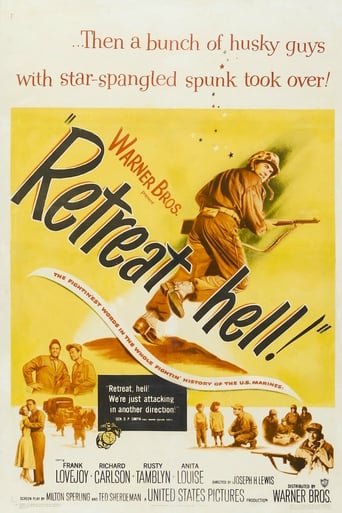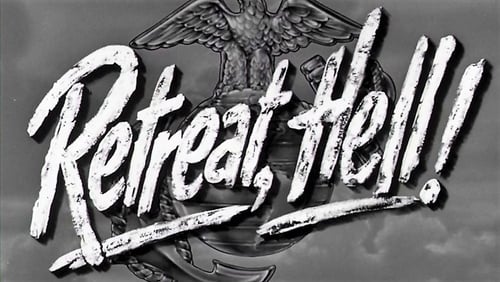Leofwine_draca
RETREAT, HELL! is a fun and patriotic little Korean War movie with a greater emphasis on characterisation than most B-flicks of the era. Shot in black and white on a low budget with the copious use of (decent) stock footage of the real war, this follows a reluctant captain (played by CREATURE FROM THE BLACK LAGOON's Richard Carlson) as he leads his men against overwhelming numbers of Chinese and North Koreans during that violent escapade. The film's script is snappy and the characters are well drawn, even if only a few of them get our focus: Frank Lovejoy's no-nonsense lieutenant colonel stands out here, as does Russ Tamblyn's ever-so-youthful recruit (and it must have been one of the few times that an actor's age matched that of the character he played). RETREAT, HELL! doesn't have the finest action scenes you'll see, but it doesn't prove to be boring either, and I rather liked it.
Cristi_Ciopron
Directed by Joseph Lewis, 'Retreat …' has action, likable melodrama, well-meant drama (at 1st, I took it for a portrayal, of the captain, but then he morphs into a smiling, paternal officer, almost a priestly one; regardless, there is enjoyable, if conventional, mostly phony portraiture: the sensitive captain, the righteous colonel, the brave kid), a good small cast (playing marines from the 1st battalion of the USMC fighting in Asia, the plot picks up a few people), desolate wintry landscapes, barren frozen hills, 'actual combat film', some _fanfaronade …. Its militarism and colonialism are ideological and obtuse. They were so in the British boys' yarns written a century before this movie was made. J. Lewis makes no attempt at explaining this war, of giving its reason. He merely strives to boost the will to fight. The marines are a sheer grace by their mere presence in a foreign country. From this angle, it's sillier than the British colonialism, which hinted to an aim, beyond the hecatomb itself. 'Retreat …' upholds the militarist ideology of the yank foreign policy. Willis and Rourke have the same ideas today.If you wish for a war movie, the director mastered the craft, Lewis meant to teach kids that fight is worth, also the pride of being a marine, and we are taught, with uplifting music, that 17 is a good age to go to war, because the President cares for you and your family, and the army will gulp as many sons as offered, perhaps the kids are at 1st a bit morose, but only until they come to learn; it's a lively, well directed movie (the smoothness of the ancient Hollywood, so misunderstood of its New Wave French fans …), with a mediocre script taken over by silliness and shamelessness. There are several battle scenes, exciting and suspenseful, like the one with the grenade, or the one with the bazooka and the tank; most of the acting, save the action scenes, which are enthralling, was phony and dissonant, perhaps it seemed less so 60 yrs ago, but perhaps to some it seemed offensive even then. The officers are chivalrous, kindhearted, sensitive and wise …. The captain himself is taught, and learns, grace to the prudence and insight of the colonel. In the 2nd avatar of the captain, his sunny, trusting smile made me almost suspicious of his sanity, but it became unequivocal that it was only meant to show his newfound optimism. At 1st, he was anxious, but then, with help from his colonel, he fights resolutely for his country.As its main subplot (!), 'Retreat …' is a kids' movie, about a boy in war. The title means that the retreat becomes a victory march ('retreat my ass', the triumph of retreating victoriously). So pushing kids to enlist, why not, maybe Lewis believed in this rubbish. Yet I feel like I am being unfair to this movie, even on my own terms, even being given its phoniness; but the craft becomes a tool for militarism and colonialism, and for the will to fight without ever asking why. The objections aside, 'Retreat …' is likable, suspenseful, occasionally dramatic, at first funny, and nicely crafted by a man, J. Lewis, who knew his job and meant no harm.
greenheart
This is a war movie which focuses more on the feelings, emotions and insecurities of the platoon as well as providing a shed load of action & explosions. For this to work, you have to care about the characters. The hard edged Colonel is well portrayed and you can see the humanity leaking out of him as the pressure intensifies. The Captain who is centre of attention early n, fades into the background somewhat. The real star is young, fresh faced McDermid. You feel as if you are with him every step of his journey, you feel his nerves, pain & bravery. Although in black and white, you can almost see the red mist descend in one poignant scene. There are loads of explosions and plenty of action for the late night viewer but this is a war film with a deeper than average plot line.
Vornoff-3
Now, don't get me wrong, `Retreat Hell' is an action-packed film, full of tension and combat, with the expected heroism and violence.It's just that it has a...sensitive side. It somehow seems out of place for its time, more suited for the 70's than the '50s.Richard Carlson is an unlikely hero for a war picture, particularly one from the hard-edged, patriotic 1950's. He's such a sensitive, nice fellow, and, to those of us accustomed to seeing him portray science-nerds (as in `Creature from the Black Lagoon' and `It Came from Outer Space') he may seem a tad intellectual for a leader of a Marine company. Even more unlikely is baby-faced Russ Tamblyn (who was still billing himself as `Rusty' at the time) as a rough-necked Marine Corps grunt. But that's the kind of picture this was: a war movie that dealt with the human face of war, even to the point of making `our boys' seem downright sentimental, but without being even remotely a vehicle for pacifist sentiments. It's an unusual, even eccentric approach, and at times it doesn't work, while at others it surprises with effectiveness.There aren't very many war movies about Korea, today called `the forgotten war' in America. The most well-known one, `MASH,' was an unabashed allegory for Vietnam, and one quickly loses sight of the distinctions. `Retreat Hell' is much more specific, and accurate, in its portrayal of a war most Americans don't really know what to make of. It was the war we didn't quite lose, but certainly didn't win, and for the post-WWII generation, that was a perplexing legacy. Many of the more extreme patriots of the day chose to rationalize it by asserting we had been railroaded into the war by the UN, possibly as part of a Communist conspiracy. `Retreat Hell' avoids political uncertainties by focusing on the lives of brave but sympathetic soldiers, who did their duty as the American leadership saw fit to define it.The title, which sounds like a statement of defiance (`like Hell we'll retreat') is actually a somber quotation from General MacArthur. At the time the forces in Korea had overextended themselves, and become surrounded on all sides. The order was given to break through the enemy lines to the sea. When asked about the retreat in Korea, the general replied `Retreat Hell, we're advancing in the other direction.' A retreat normally means falling back through your own lines to reach a stronger position, but this was an advance, through enemy lines, to a position that would allow a retreat.Unlike many WWII pictures that were being made at the time, actual Asian actors were used to portray Asians, and not all of them were evil. The filmmakers evidently thought enough of their audience to remind them that the war was being fought for our Asian allies, not as a racist war against a generic enemy. In light of recent political developments, it is interesting to note that the British also make an appearance on our side. The Communist soldiers are portrayed as devious and callous, but not beyond the realities of the war (obviously Bad Things committed by our side are not shown) - they are not inhuman, merely the enemy.This movie gives us both action and drama, and probably was a precursor to `Saving Private Ryan' in more ways than one.




